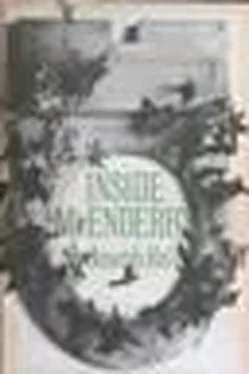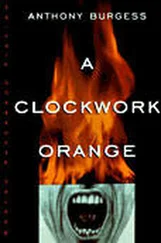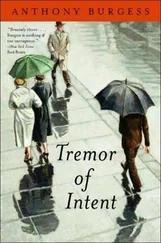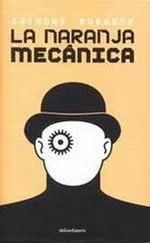The poem was to be called, tentatively, The Pet Beast. Enderby realized that a great deal of work had to be done on it, symbols clarified, technical knots unravelled. There was the disinterested craftsman, Daedalus, to be brought into it, the anti-social genius with the final answer of flight. There was Pasiphae's pantomime cow. He tried out, in his deep woollily inept voice, a line or two on a hushed audience of hanging dirty towels:
He, the cold king, judged cases in his dreams.
Awake, lithe at his task,
The other whistled, sawing pliant beams.
Law is what seems;
The Craftsman's place to act and not to ask.
The words, resounding in that tiny cell, acted at once like a conjuration. Just outside the flimsy door of Mr Enderby's ground-floor flat was the entrance-hall of the house itself. He heard the massive front door creak open and the hall seemed to fill with New Year revellers. He recognized the silly unresonant voice of the salesman who lived in the flat above, the stout-fed laugh of the woman who lived with him. There were other voices, not assignable to known persons but generic, voices of Daily Mirror -readers, ITV-viewers, HP-buyers, Babycham-drinkers. There were loud and cheerful greetings:
"Happy New Year, Enderby!"
"Prrrrrrrrp!"
The stout-fed woman's voice said, "I don't feel well. I'm going to be sick." She at once, by the sound of it, was. Someone called:
"Give us a poem, Enderby. 'Eskimo Nell' or 'The Good Ship Venus'."
"Sing us a song, Enderby."
"Jack," said the sick woman weakly, "I'm going straight up. I've had it."
"You go up, love," said the salesman's voice. "I'll be after you in a minute. Got to serenade old Enderby first." There was the noise of a staggering fall against the door of Enderby's flat, a choirmaster's "One two three", and then the vigorous ragged strains of "Ach Du Lieber Augustin", but with rude English words:
Balls to Mister Enderby, Enderby, Enderby;
Balls to Mister Enderby, ballocks to you.
For he keeps us waiting while he's masturbating, so -
Enderby stuffed moistened pellets of toilet-paper in his ears. Locked safely enough in his flat, he now locked himself safelier in his bathroom. Scratching a warmed bare leg, he tried to concentrate on his poem. The revellers soon desisted and dispersed. He thought he heard the salesman call out, "That's the enderby, Enderby."
Cosily muffled against the sharp marine morning, Enderby walked down Fitzherbert Avenue towards the sea. It was ten-thirty by the Town Hall clock and the pubs were just opening. He passed Gradeleigh ("for Gradely Folk"), Kia-Ora (retired Kiwis), Ty-Gwyn (couple from Tredegar), Channel View, White Posts, Dulce Domus, The Laurels, Ithaca (former classics master and convicted pederast). Converted to flats, humbled as guest-houses, all were owned by foreigners from north and west of the downs, bemused by an image of the glamour of the south coast: France winked at night across the water; here the air had a fancied mildness. Not today, thought Enderby, smacking his woolly bear-paw palms together. He wore a scarf coloured like a Neapolitan ice; his overcoat was a tightly-belted Melton; he was shielded from heaven by a Basque beret. The house wherein he had a flat was, he thanked that same heaven, nameless. Number 81, Fitzherbert Avenue. Would there ever, some day, be a plaque to mark that he had lived there? He was quite sure not. He was one of a dying race, unregarded by the world. Hurray.
Enderby turned on to the Esplanade, joined a queue of old women in a cake-shop, and came out with a seven-penny loaf. He crossed over to the sea-rail and leaned on it, tearing the loaf. The gulls wheeled screaming for the thrown bread, beady-eyed greedy creatures, while the sea whooped in, the green-grey winter Channel, then grumbled back, as at the lion-tamer's whip, grudgingly rattling many tambourines. Enderby tossed the last crumbs to the bitter air and its grey planing birds, then turned from the sea. He looked back on it before he entered the Neptune, seeing in it, as so often from a distance, the clever naughty green child which had learned to draw a straight line free-hand.
The saloon-bar of the Neptune was already half-filled with old people, mainly widows. "Morning," said a dying major-general, "and a happy New Year to you." Two male ancients compared arthritis over baby stouts. A bearded lady drank off her port and slowly, toothlessly, chewed the mouthful. "And to you too," said Enderby. "If I can live to see the spring," said the general, "that's all. That's as much as I can hope for." Enderby sat down with his whisky. He was at home with the aged, accepted as one of them, despite his ridiculous youth. Still, his recorded age was a mere actuarial cipher; his gullet burning as the whisky descended, his aches and pains, his lack of interest in action-these made him as old as the crocks among whom he sat.
"How," asked a gentle tremulous man made of parchment, "how," his hand shaking his drink like a dicebox, "how is the stomach?"
"Some quite remarkable twinges," said Enderby. "Almost visible, you know. And flatulence."
"Flatulence," said the major-general, "ah, yes, flatulence." He spoke of it as though it were a rare old vintage. "Many years since I've had that. Now, of course, I eat nothing. A little bread soaked in warm milk, morning and evening. I swear it's this rum that's keeping me alive. I told you, did I, about that contretemps over the rum ration at Bruder-stroom?"
"Several times," said Enderby. "A very good story."
"Isn't it?" said the general, painfully animated. "Isn't it a good story? And true. Incredible, but true."
A plebeian crone in dirty black spoke from a bar-stool. "I," she said, "have had part of my stomach removed." There was a silence. The aged males ruminated this gratuitous revelation, wondering whether, coming from a female and a comparative stranger, it was really in the best of taste. Enderby said kindly: "That must have been quite an experience." The old woman looked crafty, gripped the counter's edge with papery hands that grew chalky at the knuckles, canted her stool towards Enderby and said, very loudly, "Pardon?"
"An experience," said Enderby, "never to be forgotten."
"Six hours on the table," said the woman. "Nobody here can't beat that."
"Crump," called the major-general in an etiolated martinet's voice. "Crump. Crump." He was not reminiscing about the first World War; he wanted the barman to replenish his rum-glass. Crump came from behind the bar, seventyish, in a waiter's white jacket, with a false smile both imbecilic and ingratiating, his grey head cocked permanently to one side like that of a listening parrot. "Yes, General," he said. "Similar, sir? Very good, sir."
"I'm always telling him," said an ancient with the humpty-dumpty head of Sibelius, "about that use of the word. It's common among barmen and landlords. They say you can't have the same again. But it is, in fact, precisely the same again that one wants. One doesn't want anything similar. You deal in words, Enderby. You're a writer. What's your view of the matter?"
"It is the same," agreed Enderby. "It's from the same bottle. Something similar is something different."
"Professor Taylor used to argue that out very persuasively," said an old man mottled like salami, a dewdrop on the hook of his nose.
"What's happened to Taylor?" asked the major-general. "We haven't seen him for quite some time."
"He died," said the mottled man. "Last week. While drawing a cork. Cardiac failure."
"He'd just turned eighty," said a man just turned eighty. "Not all that old."
"Taylor gone," said the general. "I didn't know." He accepted rum from obsequious Crump. Crump accepted silver with an obsequious inclination of a broken and mended torso. "I thought I'd go before him," said the general, "but I'm still here."
Читать дальше








